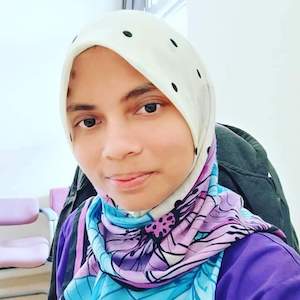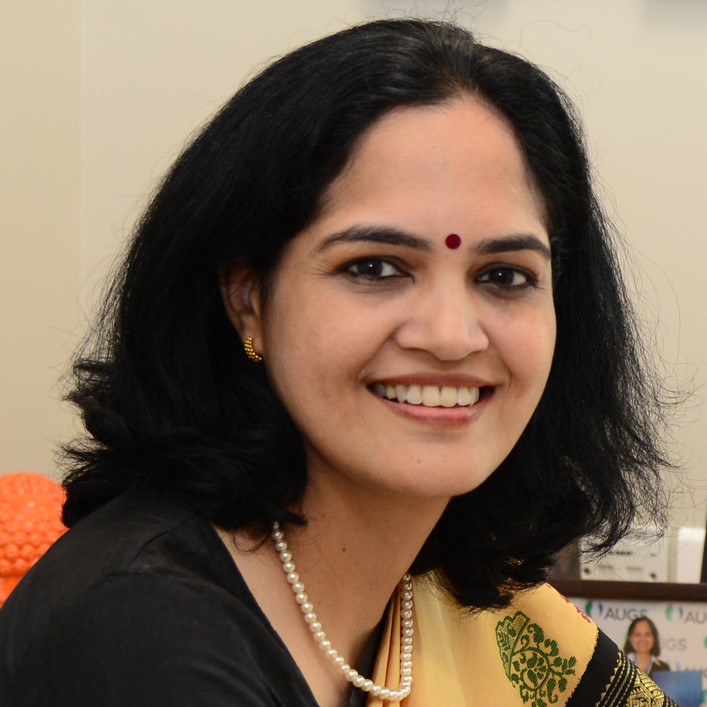





The confirmed cases and casualties have numbered in the millions. This has, in turn, caused unprecedented disruption to healthcare systems and the process of medical education and fellowship training worldwide.
The COVID-19 pandemic changed life as we know it and made us more resilient to continue to achieve our life goals and priorities. Urogynecology fellowship programs worldwide have had to adapt to the ever-evolving situation to ensure that fellows get their due.
We asked our experts worldwide - Anna Rosamilia, Associate Professor, Monash Health, Australia; Roxana Geoffrion, Associate Professor, University of British Columbia, Canada; and Sushma Srikrishna, King’s College Hospital, NHS, UK - to share their views of the impact of the pandemic on fellowship programs and their solutions.
Dr. Srikrishna: More than 20 years in King’s college. There are two types of training. One is a research track (job) where the trainee is expected to work on a higher research degree or publish 2 first author papers/present at an international scientific meeting (IUGA/ICS/UKCS). The other is a 3-year subspeciality program where they will learn clinical-based investigative procedures, conservative management, surgical techniques, management of complications, etc., and at the end of fellowship the trainee will be awarded with a research degree and or be accredited in urogynecology training.
Dr. Rosamilia: Initially we offered fellowship in combination with Prof. Peter Dwyer in Royal Women and Mercy Hospital, then we established our own urogynecology program in Monash since mid-2000. It’s a 3-year advanced subspeciality fellowship which can be entered in final year of RANZCOG training. In general, the trainee will have different institutions and different supervisors. They need to fill in a logbook with a minimum number of procedures, and there is a research component which needs to be submitted and peer reviewed. In the second and third year of training there is a clinical examination in the form of written and oral. Currently it is written only.
Dr. Geoffrion: At the University of British Colombia, it started in 2008 with international fellows followed by Canadian fellows. In Canada, it’s a non-accredited fellowship (similar with 12 other fellowship programs across Canada) and we are still working on accreditation with the Royal College. It is a 2-year program; mainly 4 days of clinical and 1 day of protected research time in 2 sites with 2-3 urogynecology staff. The trainee will get 1-3 operative sessions per week. Structure, list of procedure and objectives are very similar with the U.S. standards. The fellows also participate in department research and are also required to come up with their own research project that is feasible to start and end within 2 years. We have a research infrastructure and coordinator, statistician, and academician in place to help the fellows with their research.
Dr. Srikrishna: It has had massive impact on the training. More than 80% felt that their training was negatively affected by COVID-19. People have had their outcome modified, assessments have been relaxed, and training extended. Clinic has been dramatically reduced, UDS were not done.
Dr. Rosamilia: The main problem is restriction to elective surgery and achieving the numbers required in the trainee logbook. The current trainees started at the beginning of 2019. Their activities include being the primary surgeon, under supervision in a public hospital, and private assisting. They also attended outpatient public clinics, urodynamics, perineal clinics before. However, due to the pandemic, the number of patients being seen in clinics were also reduced as patients were discouraged from coming face to face.
Dr. Geoffrion: OR exposure has been primarily impacted. We have a stop and go approach in Canada whenever we have wave of COVID-19. Elective surgery slowed down from 4-5 OR to 1-2 OR per staff. That has been frustrating. Another thing is, as our fellowship is not accredited, the fellow also draws salary from OR assistance, and with the reduced numbers, and their salary was also affected.
Meeting the necessary patient recruitment numbers for research purposes were also very challenging. Everything became delayed and took twice as long.
Dr. Srikrishna: During the peak of the pandemic. everyone got deployed to cover other areas. As the practices are limping back, everyone has become more creative with use of online platforms for teaching and conferences. Whenever there is an opportunity, we try to ensure that the trainees get at least some form of hands-on-training, allowing different trainees to practice on one patient. A simple example would be: in patient undergoing vaginal hysterectomy and pelvic floor repair, one trainee performs the vaginal hysterectomy, another does anterior repair, etc. We also mobilize the trainee to other hospital(s) to observe fascial sling procedures, perineal clinic, endoanal ultrasound, and laparoscopic surgery to allow training to continue.
Dr. Rosamilia: We’ve increased their training time, by not taking in new fellows to allow current fellows more time. Although their logbook is sufficient, it is not as good as it could have been previously. The fellow will need continuous support even after they have finished, as a junior consultant.
Dr. Geoffrion: We sent them to other site(s) for more OR exposure. It has been really challenging. We try to engage them with other available OR. For example, they are sent over to a laparoscopic surgeon to assist in laparoscopic suspension abdominally. However, one positive result of is increased efficiency in presentations. The trainees are supposed to present literature as part of the learning objective. Now that everything is virtual/Zoom-based, there’s much more participation and presentations are more convenient and easier to organize. Also, when there is a free afternoon, the fellow can shift to telehealth and call up a patient. Telehealth is accepted by the patient and the medical community; and resulted in a reduced waiting list. Maybe we are not able to operate as much but we are able to see more patients through telehealth and learn medicine that way.
Dr. Srikrishna: A survey of the trainees showed that changes in operating list training were reported by 88%; 75% reported that they were unable to get access to urodynamics training; over 60% reported an adverse impact on overall courses and teaching. 40% said that they require an extension between 3 months to a year and 25% anticipated that they will require an extension. So far there are 3 in house fellows, and until now we are still not able to take in international fellows.
Dr. Rosamilia: In January – February 2022, we had the worst amount of restriction. Since January 11, we were only allowed to performed Category 1 surgery (cancer or cancer surveillance). All elective surgery - both public and private - were postponed. There were times when we were allowed Cat 2A surgery in the last year and a half (severe prolapse, severe pain that requires mesh removal). Due to the nature of incontinence surgery, it doesn’t fit in Category 2 or 2A surgery.
Dr. Geoffrion: Yes, numbers of elective surgery have been reduced.
Dr. Srikrishna: To allow training to continue there are simulation courses/workshops- minimal access surgical training module, pig model, perineal model, and emergency simulations. We have established a mentorship model with a senior consultant operating together with a young trainee to train and mentor the trainee during surgery.
Dr. Rosamilia: It’s difficult because you can’t replace the hands-on surgery. We have video workshops, research with sheep surgery, some private assisting in cases of cancer surgery, sort of simulation videos, webinars, educational webinars, and IUGA and ICS have provided some resources. Some activities were remote, such as journal clubs, but it doesn’t really replace the hands-on surgery.
Dr. Geoffrion: We send our fellows to other units/sites to assist other surgery. We were able to hold anatomy lab (human prosection and cadaver dissection), but again the rules are changing, and some of the simulation programs were withheld as crowding everyone together was not allowed.
Dr. Srikrishna: There were hard times - shortage of PPE, everyone was afraid for themselves and for their loved ones. Lots of goodwill from the public including free food, appreciation banners, flags to show support, charity groups sewing clothes and PPE embroidered with a small little heart, and online mental health support. Consultants and educational supervisors also were very supportive and open to lend their ears to support their trainees.
Dr. Rosamilia: It’s been a long process and concern about being asked to do obstetrics cover - the fellows have done their share of helping. At the moment, we don’t have junior staff, there are no junior staff/registrar/residents being exposed to urogynecology. As for psychological support, we are a close-knit unit, and we provide support in an informal way.
Dr. Geoffrion: We only have one fellow every 2 years. We have staff related to the resident program. There are support systems available, and as of now I am not aware of any fellows having any psychological problem so far.
Dr. Srikrishna: We have learned that we can adapt, be more creative by carrying out assessment online. Assessment occurs every 3-6 month to see if the training post and goals have been met via an interview with supervisors and the College chairman. I am very hopeful that the international fellowship will be re-established and that the conferences will once again be face to face.
Dr. Rosamilia: It’s being done the same way. There are 3 monthly assessment and discussions, 6 monthly more formal assessments (logbook, competency, procedures, research progress, assessment on ability to analyze a paper and presenting it). In some ways there are more opportunities to do more educational stuff that isn’t surgery. The main problem is that the assessor and the College have flagged people who missed out on numbers in the logbook.
Dr. Geoffrion: We have 3-6 monthly assessment depending on the length of their rotation. It is an objective evaluation and a surgical grading scale that is being circulated by the administrative staff to the urogynecology staff that they work with and assessment of their supervisors by the trainee. We will go over the list of procedures. If they are not comfortable with a certain procedure, we will try to look for cases that they can assist with to help them out.
Dr. Srikrishna: We never give up! We might get overwhelmed, but we joined urogynecology for the passion of it. As long there is passion, we will find the way. When there is humanity, there is hope. As long as the human spirit and resiliency remains, this pandemic will be over, we will put this behind us and we will move forward and upward. Good luck to everyone!
Dr. Rosamilia: Hang in there! Hang in there! We are all in the same boat, frustrated, not able to provide the service we used to provide. Take up any opportunity you can to go to theater, learn from another group – oncology, for example, that hasn’t had their surgery restricted. Use the educational resources and website. Keep on reading. It’s just probably going to get a little bit longer to get all the numbers.
Dr. Geoffrion: I guess just come with specific objectives and keep the dialog going with your mentors/ supervisors and if there’s a red flag or procedures you are not performing or questions, just feel free to approach somebody. Some fellows do express their apprehension about not having enough procedures. But you must realize that learning continues, and it is a lifelong process. Even after you graduate you can always get your mentor to help and just don’t be afraid to ask for help.